Agarwal Lab
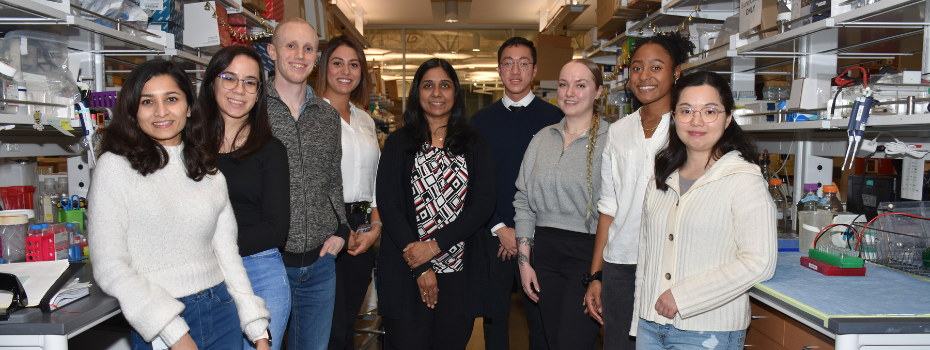
Our laboratory is interested in understanding the interplay between genetic drivers and the extrinsic stressors from the niche so that disease can be identified at an early stage and new intervention or prevention approaches can be uncovered for leukemia patients.
Learn about our projects
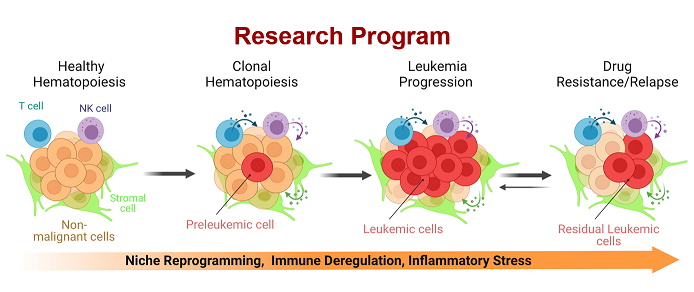
1. Genetic modalities in leukemia predisposition syndromes and clonal hematopoiesis models
Clonal evolution in Acute Myeloid Leukemia (AML) is the stepwise acquisition of secondary mutations starting from the preleukemic stage. Preleukemia is defined by germline mutations in leukemia predisposition syndromes and acquired mutations in clonal hematopoiesis. Understanding the mechanisms of disease transformation from the preleukemic stage is critical to identifying high-risk individuals and developing early interventions. To address these questions, we are using RUNX1-mutated familial platelet disorder (FPD) and TET2-mediated clonal hematopoiesis as models. Our group is implementing cutting-edge methods and multi-parametric single-cell analysis to perform a comprehensive characterization of preleukemic primary samples and to identify new mechanisms of disease initiation. In addition, we perform validation of identified pathways using in vivo mouse models and identify novel early intervention and prevention strategies.
2. Extrinsic mechanisms that regulate hematopoiesis of healthy and malignant stem cells
We believe that the complex signaling milieu of the bone marrow niche creates a selective pressure at the early leukemic stage to promote the clonal growth of leukemia cells. Consistent with this, we and others have identified several proinflammatory cytokines that have a paradoxical effect on the clonal growth of leukemia cells while suppressing the growth of healthy nonmalignant cells. We are performing omics-based analyses to identify the molecular signature that leads to niche-driven functional differences in nonmalignant and malignant stem cells as well as characterize changes in the bone marrow niche. This comprehensive approach will allow us to gain insight into the signaling mechanisms that contribute to the clonal growth of leukemic stem cells, enabling the design of therapeutic strategies to target malignant cells specifically.
3. Mechanisms of molecular conduit between the extrinsic niche factors and leukemic cells
It is likely that not only the extrinsic stresses but also leukemia cells reprogram their niche. For instance, treatment with cytotoxic therapy promotes the release of signaling mediators from leukemic cells that recruit immune cell responses to blunt malignant cell killing. Additionally, cytotoxic therapy-mediated reprogramming of the niche may promote the survival of leukemic cells by releasing growth-promoting cytokines. We propose that delineating these mechanisms will establish a novel paradigm for designing strategies to target aberrant niche-driven signaling. For this, we are using a combination of single-cell genomics, transcriptomics, and epigenetics as well as genome-wide CRISPR screening methods.
Learn more
Since 2014, the Agarwal lab is generously funded by:
- NIH/NCI K99/R00 Pathways to Independence Award
- NIH/NCI R01
- NIH/NHLBI R01
- V Foundation Scholar Award
- American Cancer Society Research Scholar Grant
- The Babich Family Foundation /Alex's Lemonade Stand Foundation
- EvansMDS foundation
- Pilot funds from the OHSU Knight Cancer Institute - Hillcrest Committee, CEDAR Research Project grant, and NIH Build Exito Pilot Project Award as well as collaborative projects through NCI U54 Drug Resistance and Sensitivity Network (DRSN) and U01 Clinical Proteomic Tumor Analysis Consortium (CPTAC)
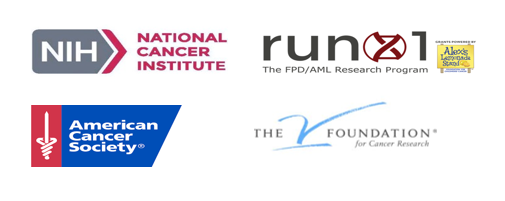
March 14, 2022
Study reveals inherited risk of leukemia
Nov. 18, 2019
OHSU News
Study overturns basic tenet in leukemia biology
Dec. 27, 2017
Knight Cancer signal achievements of 2017
Dec. 22, 2017
Solving the problem of drug-resistant cancer
June 27, 2017
OHSU News
OHSU Knight Cancer Institute and Pacific Northwest National Laboratory team up to focus on a complex form of leukemia
March 28, 2017
OHSU News
In search of treatment for a perilous form of leukemia
Feb. 21, 2017
OHSU News
Gene mutations cause leukemia, but which ones?
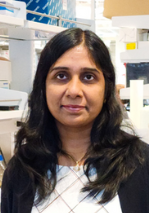
Anupriya Agarwal, Ph.D.
Professor
Division of Oncological Sciences
Division of Hematology/Medical Oncology
Department of Cell, Developmental and Cancer Biology
Department of Molecular & Medical Genetics
OHSU School of Medicine
OHSU Knight Cancer Institute
Education:
M.S., Microbiology, G.B. Pant Univ., India
Ph.D., Microbiology, Dr. R.M.L. Avadh Univ. and ITRC Institute, India
____________________________________________
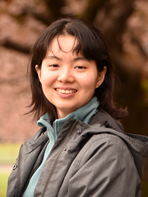
Hsin-Yun Lin, Ph.D.
Postdoctoral Scholar
Education
B.S., Biotechnology, East China University of Science and Technology
M.S., Biological Engineering, University of Missouri
Ph.D. Cancer Biology Program, Oregon Health and Science University
Scientific interests
Hsin-Yun is interested in understanding the molecular mechanisms of disease progression mediated by inflammatory cytokines in Acute Myeloid Leukemia progression.
Hobbies
She enjoys running with friends, reading short stories and baking coconut macaroons in her free time.
____________________________________________

Aishwarya Sahasrabudhe, Ph.D.
Postdoctoral Scholar
Education
B.Sc.., Advanced Zoology and Biotechnology, Stella Maris College, University of Madras, India
M.Sc., Zoology, Savitribai Phule Pune University, India
Ph.D., Biology, Texas A&M University
Scientific interests
Aishwarya is interested in understanding how secondary mutations contribute to leukemic transformation in the context of inflammatory stress inn pre-malignant and malignant settings.
Hobbies
Aishwarya enjoys dancing, traveling, sketching and spending time with her family and friends.
____________________________________________
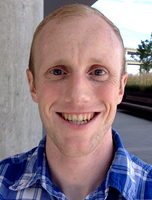
John McClatchy, B.S.
Graduate Student
Education
B.S., Biology and Bioveterinary Science, minors, Chemistry and Computer Science, Utah State University
Scientific interests
John is interested in developing strategies to identify and prevent leukemia progression at early stage in familial Acute Myeloid Leukemia. He is approaching his research interest by characterizing the function of novel germline mutations and understanding their interactions with the inflammatory niche.
Hobbies
John enjoys ballroom dance, longboarding, gymnastics, reading, skill-based games and free food.
____________________________________________
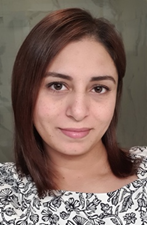
Mona M. Hosseini
Ph.D. candidate
Education
B.S., Biology with a minor in Chemistry, Portland State University
Scientific interests
Mona is interested in dissecting new signaling pathways involved in leukemia initiation and progression in the context of microenvironment in Acute Myeloid Leukemia.
Hobbies
Mona enjoys hiking, finding spectacular spots, and taking pictures. She also enjoys reading and watching movies/documentaries.
____________________________________________
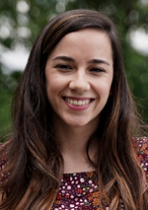
Luiza Ostrowski, M.S.
Computational Biologist
Education
B.S., Biological Sciences, University of Sao Paulo
M.S., Bioinformatics and Genomics, University of Oregon
Scientific interests
Luiza is interested in understanding how inflammation can modulate the progression of Acute Myeloid Leukemia.
Hobbies
Luiza enjoys traveling, baking, and spending time with her family, friends, and her two cats.
____________________________________________

Briana Johnson
Research Assistant 2
Education
B.A., Molecular Biology and Biochemistry, Middlebury College
Scientific interests
Briana is interested in the connection between genetics and drug resistance in Acute Myeloid leukemia. Briana is pursuing an M.D./Ph.D. to become an obstetrician gynecologist and hopes to study obstetrical oncology.
Hobbies
Briana really enjoys outdoor activities such as hiking, running, and paddleboarding. She also enjoys creative activities like painting and dancing. Briana loves watching anime, listening to music, and reading during her downtime.
____________________________________________
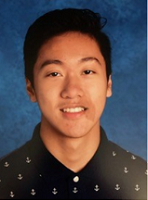
James Vo
Research Assistant 2, part-time
Education
B.S., Biology, Portland State University
Scientific interests
James is interested in understanding the mechanisms of clonal evolution and drug response.
Hobbies
James enjoys playing sports, exploring nature and watching movies.
____________________________________________
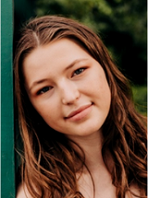
Dmonica Reutov
Student Intern
Education
B.S., in progress, biochemistry, Portland State University
Scientific interests
Domnica is currently interested in continuing to expand her knowledge of drug-resistance mechanisms in acute myeloid leukemia.
Hobbies
Domnica enjoys going on walks with her German Shepard, playing volleyball, baking a variety of different desserts and reading.
____________________________________________
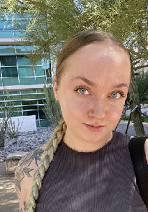
Kate Gutowsky
Senior Research Assistant
Education
B.A., Neuroscience. Reed College
Scientific interests
Kate is interested in discovering new therapies to counter drug resistance seen in Acute Myeloid Leukemia and contributing to the field of translational medicine.
Hobbies
Kate enjoys cooking for friends and family, lifting heavy weights in the gym, playing Minecraft, and talking about astrology.
____________________________________________
- Emily Wolfe, Postdoctoral Scholar
- Ashis Ramtel, Student
- Camryn Berry, Research Assistant 2
- Joyce Anne Cuenca, Student Research Intern
- Katia Rebola, Postdoctoral Scholar
- Ariel Miyama
- Maya Caruso
- Adam Duvall, Clinical Fellow
- Rucha Modak, Postdoctoral Fellow
- Andrea Monteblanco, Research Assistant
- Karina Thiel-Klare, Research Assistant
- Ruthey Viver, Student Research Intern
- Alisha Steigerwald, Student Research Intern
- Alyssa Carey, Research Assistant
- Megan Cleary, Sr. Research Assistant
- Swati Garg, Graduate Student, Summer Rotation
- Kristina Halvorson, Research Assistant
- Clayton Hudson, Graduate Student, Rotation
- Bernadette Maertens, Murdock Scholar
- Alka Puri, Visiting Intern
- Rhese Thompson, Murdock Scholar
- Michie Degnin, Senior Research Assistant
- Chris Eden, Research Assistant
- Sherif Abdelhamed, Assistant Staff Scientist
- Gabby Dewson, Murdock Scholar
- Homma Khosroyani, Graduate Student, Rotation
- Gabriel Cohn, Graduate Student, Rotation
- Tiffany Lee, Medical Student Research Intern
Join our team
We are looking for enthusiastic and motivated individuals to join our lab. If you have a strong background in cell biology and the ability to perform basic computational analysis using large data sets, we'd love to hear from you.